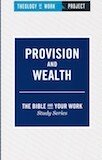Lessons from Elite Leaders: Speaking in Different Registers at Work, Part 5 of 8
Blog / Produced by The High Calling
Part 1 | Part 2 | Part 3 | Part 4
Part 5 | Part 6 | Part 7 | Part 8
People are afraid of evangelicals. Why? Laity Leadership Senior Fellow D. Michael Lindsay says his latest research shows that those outside the evangelical fold have fears about evangelicals based on two things:
- They’re afraid evangelicals won’t do the things they say they’ll do.
- They’re afraid evangelicals will do some of the things they say they’ll do.
For example, people don’t believe it when an evangelical leader says, “I draw on my faith; it gives me a sense of meaning and purpose; it sacralizes my work and helps me face some of the challenges that come my way, but I’m not here to convert you or force faith down your throat, or manipulate the work place so that it becomes like a church.”
Likewise, if they’re asked a generic question like, “Do you think evangelicals are trying to take over the country?” they may say yes. But when they’re asked about particular evangelicals they have encountered in leadership, they generally express positive attitudes. The exception is in the political realm, where Lindsay finds significant polarization. He says, “I bracket that off because I don’t know how, as a social analyst, to separate out someone’s faith from their politics. I think so much of how we respond relates to how those things work hand in hand in the political sector.”
He says we need to learn how to “speak in different registers” at work in order to alleviate these fears. In a 2009 article in the Journal of Religious Leadership, Lindsay explained that learning to speak in different registers is like a professional singer learning to sing a wide range of notes. One of the best ways to do this is through what he calls “signaling behavior.” Signaling is communicating a particular message to a select audience while speaking to a wider one. “It depends upon implicit and subtle messages without full disclosure in instances when explicit declaration would be unacceptable,” he wrote.
Evangelical leaders sometimes allude to writers like John Stott or C.S. Lewis to signal their faith convictions without triggering a negative reaction in non-evangelical listeners who may not be familiar with these authors. He concedes that signaling can communicate a mixed message, but says it’s “part of the larger task of managing different identities” that we all undertake in public life.
“Signaling behavior allows you to be true to who you are, while at the same time not putting off people,” he says. Although this can still be a scary proposition for some outside the fold, he adds, “I don’t think they would welcome a more public expression of faith.” This technique is especially useful for those working in large organizations like publicly traded corporations, state universities, and government agencies.
One way we can learn to speak in multiple registers is to develop unique voices while leading for the common good. We can do this by learning to provide public commentary on a range of contemporary issues for which our faith convictions add fresh perspective.
In his journal article, Lindsay wrote, “The challenge will be to develop a voice that appeals to the non-religious world without forfeiting a speaker’s religious dialect.” This approach “is required in order for new entrants to gain a hearing in a crowded and noisy public square. But, giving up their unique, faith-informed perspectives—which may have been shaped in the cultural margins, not the mainstream—would be equivalent to losing one’s voice on stage at the very moment the hushed audience has readied themselves.”
Have you learned to speak in different registers at work without losing your distinctive voice? If so, how do you go about it? And, what have been the results?
D. Michael Lindsay is a Senior Fellow at Laity Leadership Institute. He is Assistant Professor ofSociologyatRiceUniversityand Director of the Program for the Study of Leadership. He is also author of the Pulitzer Prize nominated Faith in the Halls of Power: How Evangelicals Joined the American Elite![]() . For this eight part series of lessons from elite leaders, The High Calling talked to Lindsay about his new PLATINUM Study, for which he has conducted 500 interviews. Image by Kristen Marie. Used with permission via Flickr.
. For this eight part series of lessons from elite leaders, The High Calling talked to Lindsay about his new PLATINUM Study, for which he has conducted 500 interviews. Image by Kristen Marie. Used with permission via Flickr.





